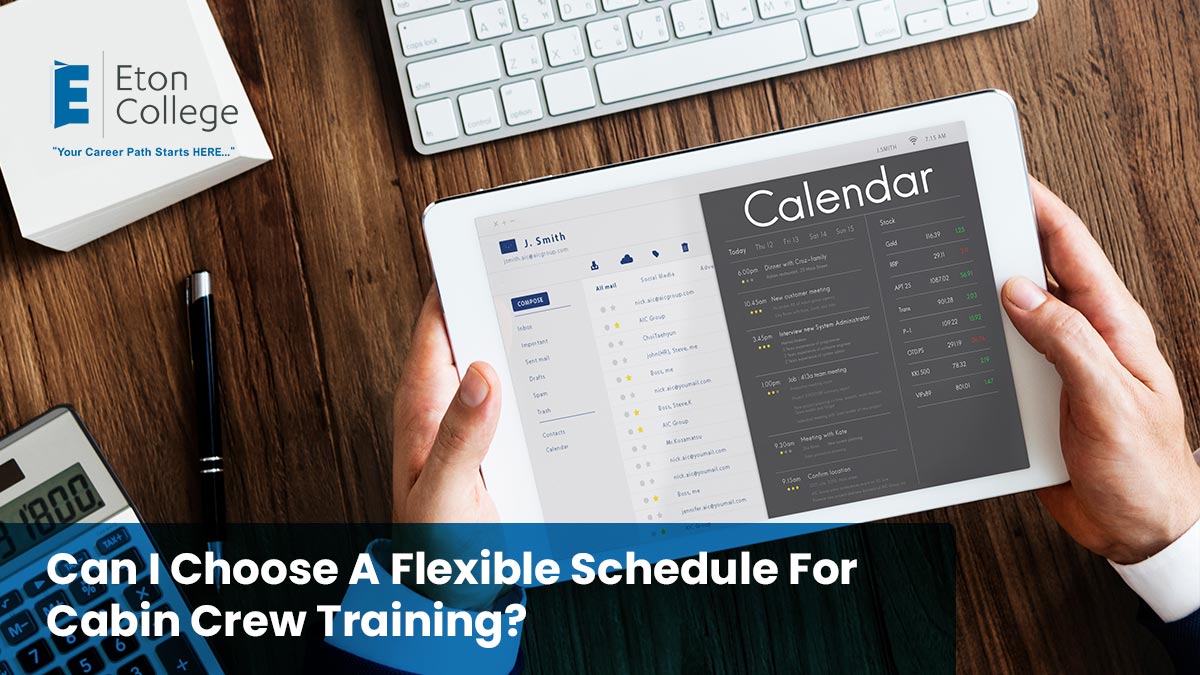- Many institutions now offer flexible training options, including part-time, online, and hybrid programs.
- Self-paced flight attendant training programs allow individuals to learn at their own speed, providing greater flexibility.
- Online and hybrid learning options make flight attendant training accessible to students from different locations.
- Flexibility in flight attendant training allows students to gain practical experience through hands-on sessions while still accommodating personal schedules.
- Choosing the right flight attendant training program depends on personal circumstances and career goals.
Many people aspire to work as cabin crew members. It provides an opportunity to travel the world, meet new people, and deliver critical services to travelers. However, cabin crew training is a necessary step in making that ambition a reality.
For those with busy lives, balancing training with work, family, or other commitments can be challenging. A common question among aspiring cabin crew members is, “Can I choose a flexible schedule for cabin crew training?”
In this blog, we’ll explore the options available for those looking for flexibility in their flight attendant training and how you can find programs that fit your lifestyle.
Understanding Cabin Crew Training
Cabin crew training is essential for preparing individuals to work as flight attendants. This training is intensive, covering areas such as safety procedures, customer service, emergency response, and in-flight operations. Trainees must also become familiar with aviation rules and regulations, airline policies, and first-aid procedures.
The training typically involves a mix of theoretical classroom sessions and practical hands-on exercises, often including simulations of in-flight situations and emergency evacuations. The duration of cabin crew training varies depending on the airline or institution, but it usually ranges from 4 to 12 weeks.
Can I Choose a Flexible Schedule for Cabin Crew Training?
The answer is both yes and no. While many airlines offer structured, full-time flight attendant training programs, some educational institutions and independent flight attendant schools have begun offering more flexible options. These flexible programs are ideal for those who cannot commit to full-time training due to personal or professional obligations.
Let’s break down the different options available for aspiring cabin crew members seeking a more flexible schedule.
1. Full-Time Flight Attendant Training Programs
Flight attendant training programs are often sponsored by airlines, offering full-time, intensive programs that require five days of weekly sessions, set hours for classes, simulations, and practical assessments. These programs are ideal for those who can dedicate themselves to the training, but may not be feasible for those with outside responsibilities.
2. Part-Time Flight Attendant Training Programs
For those who need flexibility, some flight schools and institutions offer part-time flight attendant training programs. These allow trainees to attend classes less frequently—usually in the evenings or on weekends. While part-time programs may take longer to complete than full-time courses, they offer much-needed flexibility for those balancing training with other commitments.
3. Online Flight Attendant Training Programs
Online flight attendant training programs are another option for those who require flexibility. These programs allow students to complete the theoretical portion of the training at their own pace, from the comfort of their own homes. Subjects such as safety regulations, customer service protocols, and first-aid procedures can be covered online.
4. Hybrid Flight Attendant Training Programs
A hybrid flight attendant training program combines online learning with practical in-person sessions. This option allows trainees to complete the theoretical elements of the course online, on their own time, while attending scheduled practical training sessions for hands-on experience.
5. Self-Paced Learning for Flight Attendant Training
Some institutions offer self-paced learning as part of their flight attendant training programs. This format allows students to progress through course materials and complete assessments at their own speed. This is particularly useful for individuals with demanding work or personal commitments who may not be able to adhere to a rigid class schedule.
Considerations When Choosing Flexible Flight Attendant Training
When exploring your options for flexible flight attendant training, it’s essential to consider several factors to make the best choice for your situation. Here are some key points to keep in mind:
- Accreditation: Ensure that the flight attendant training program is accredited by relevant aviation authorities or recognized by airlines. This will enhance your employability once you complete your training.
- Duration: Flexible and part-time programs may take longer to complete than full-time training, so consider how quickly you want to start your career as a flight attendant.
- Practical Training Requirements: Even in flexible programs, in-person practical training is required. Make sure you’re able to attend the necessary sessions to complete your certification.
- Cost: Private or flexible flight attendant training programs may come with higher tuition costs compared to airline-sponsored full-time training. Be sure to evaluate your budget before making a decision.
Flexibility in Flight Attendant Training is Possible
For aspiring flight attendants, there are now several flexible training options to fit different schedules and lifestyles. While traditional full-time programs are still common, many institutions offer part-time, online, and hybrid formats, making it easier for individuals to balance training with work, family, or other commitments.
Eton College in Canada offers a comprehensive Flight Attendant Preparation Program designed to equip students with the skills, knowledge, and flexibility needed to excel in the aviation industry. Whether you prefer part-time or online courses, Eton College ensures you are well-prepared to embark on a rewarding career as a flight attendant.
Selecting the right training program will ultimately depend on your personal circumstances and professional goals, but with these flexible options, your dream of becoming a flight attendant is within reach.





